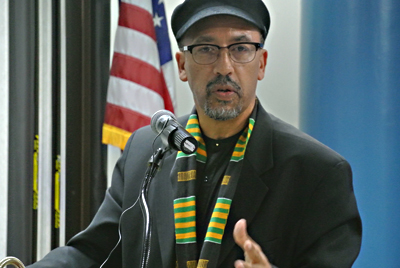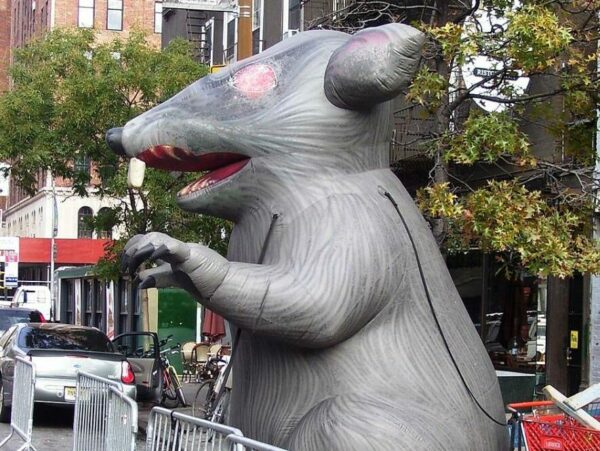The Stakes of the 2012 Presidential Election
 September 26, 2012
September 26, 2012
By Marc Bussanich, LaborPress City Reporter
Different union leaders at this year’s Labor Day march in the city said it’s important for working people to vote for President Barack Obama this November because his economic policies will help them while Mitt Romney’s policies will hurt them. Bill Fletcher Jr. gave a more nuanced explanation of the 2012 elections recently at an event sponsored by the Left Labor Project at CWA Local 1180’s offices.
In addition to being a field director for the American Federation of Government Employees, the largest federal employee union with a 650,000 membership, Fletcher is co-author of Solidarity Divided: The Crisis in Organized Labor and a New Path toward Social Justice and recent author of “They’re Bankrupting Us!”: And 20 Other Myths about Unions. He dedicated his new book to his parents, but the impetus to write the book originated from a conversation he had with a woman on a plane ride from San Jose to San Diego, CA.
He was reading a book about global labor solidarity when he noticed the person sitting next to him was trying to read the book’s title.
“I like to see what people are reading these days,” the woman said to Fletcher.
She then asked him, “What’s a labor union?”
Perplexed, Fletcher initially thought she was joking, but she wasn’t.
“So I wrote the book for her, a book I hope that begins a discussion of how progressives should engage people in the middle of the political spectrum,” said Fletcher.
 Fletcher recently penned a story for Alternet, “The 2012 Elections Have Little To Do With Obama’s Record…Which Is Why We Are Voting For Him,” which he drew from to argue that this year’s election is a referendum on demographics and redistribution.
Fletcher recently penned a story for Alternet, “The 2012 Elections Have Little To Do With Obama’s Record…Which Is Why We Are Voting For Him,” which he drew from to argue that this year’s election is a referendum on demographics and redistribution.
“Right-wing populists are deathly afraid of the changing demographics in the U.S. They see, as their predecessors believed, that the U.S. has always been and should remain a white republic.”
Although numerous Republican representatives clamor that the Obama administration is not doing enough to reinvigorate the economy, for Fletcher the right-wing populists who rail against undocumented immigrants, a woman’s choice to an abortion, gay rights and the birther movement is really about a fear of what Obama represents rather than his
policies.
Fletcher noted while the Tea Party is not necessarily anti-government per se, they are definitely anti-government for people they believe are undeserving of government services, i.e., blacks, Latinos, Asians, etc., which Fletcher believes was best encapsulated by the popular Tea Party slogan, “Government, Keep Your Hands Off My Medicare,” ironically accompanied sometimes by a hammer and sickle on the placard.
A comment written by a United Association union member on a piece on Michael Grimm by In These Times is an instance where Fletcher’s analysis proves prescient. The UA member wrote, “The Dems have gone too far pandering to the “I wants” and the gimme, gimme, gimmees. The way I see it is ….Big Business and Unions need each other.”
Fletcher then admonished progressives for their lack of strategy and views on national elections.
“The way the Left view elections is abstract. Elections are not just about who we want, but space for progressive movements to operate within,” said Fletcher.
He noted that a lack of strategy, third-party adventurism and electoral abstentionism adds up to a missed opportunity for progressive forces to increase their power.
One way Fletcher sees the space expanding for progressives is by building progressive coalitions in metropolitan areas to offer real structural reforms in areas such as housing and education. “That’s where we’ll make a difference.”
If Obama is re-elected, Fletcher said progressives should be calling for jobs and economic development immediately rather than wait until the day after he’s inaugurated in January 2013.
In an interview, when asked how New York’s labor unions can play a role in building progressive coalitions, Fletcher said, “Those of us that are active in the union movement should be pushing the unions to be a unifying force so as to develop a working people’s agenda.”
Arthur Cheliotes, President of CWA Local 1180, which represents workers working for different city agencies, said, “I sure hope so [unions getting involved in progressive coalitions]. Many political leaders have been quite good at dividing us. At some point, we need to realize the division makes us all ineffective. Unless all of us do well, none of us are going to do well.” marc@laborpress.org



